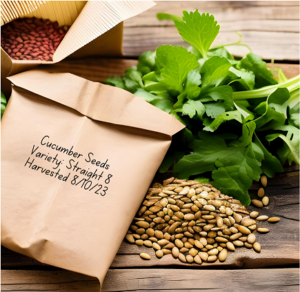We are joining libraries across the country in creating a seed library!
We hope the seed library will help to:
The seed collection includes a variety of purchased seeds and home-gardener donations. While the bulk of the collection is made up of vegetable and herb varieties appropriate for Northeastern Oklahoma gardens, occasionally there may be other items such as ornamentals or wildflowers.
The collection will change throughout the growing seasons (Spring, Summer and Fall), and availability depends on many factors such as donations and demand. You can view the current collection online in the Library Seed Catalog.
Different packets and varieties will contain different numbers of seeds. Some may have as few as 5-10 seeds per packet, others may have a good deal more. The amount will depend on availability.
Placing holds on seed packets is not an option at this time.
Seed donations are always welcome! Please see our Seed Donation Guidelines below to learn more.
“Checking Out” Seeds
Donations are welcome all year long!
> Donations can be commercial seeds in their original packaging (at least a half-packet, please) or self-harvested seeds. Donations should be any heirloom, non-GMO, non-hybrid, open-pollinated seeds from *healthy* plants. They do not have to be organic.
> Seeds from non-organic, store bought produce are NOT accepted as they will not germinate.
 How To Donate Seeds:
How To Donate Seeds:
While some seeds are purchased, most of our seeds are donations, grown and saved by home hobby gardeners. Not all varieties will be available at all times. The Will Rogers Library can not guarantee the origin, purity, viability or germination rates of all seeds. All gardening comes with a high rate of uncontrollable variables. Check out our many resources on gardening to help you reach your best chance of success!
Not all seeds that are donated will be suitable for the seed library. We will make every effort to ensure good quality seeds are utilized. Poor quality seeds showing signs of mold or disease, or seeds that are not clearly identified with labeling information will be discarded.
Garden Planting Calendars
OSU Extension’s Oklahoma Garden Planning Guide
Old Farmer’s Almanac Vegetable Garden Planting Calendar
Seed Saving
Seed Savers Exchange “Where to Start”
Old Farmer’s Almanac Vegetable Seed-Saving 101 Guide
Community Seed Network Seed Saving Resources
NYBG “Collecting and Storing Seeds”
Of course, we also have a large collection of books on our shelves (and e-books!) about seed saving, planting, growing, different types of gardening, harvesting, soil, composting and much more! Come in and check them out!
Our initial collection is made up of seeds donated by seed companies and seeds purchased from grant funds. Eventually, the seeds will come from you and other local gardeners.
No. We certainly hope that you will, though, as the seed library cannot continue or grow without donations. However there is no obligation to return seeds.
That depends on the plant. Most are fairly easy, but some plants can be finicky. Be sure to check out our resource links on this page, or one of our seed saving books available in the library or on e-book.
Different packets and varieties will contain different numbers of seeds. Some may have as few as 6-10 seeds per packet, others may have a good deal more. The amount will depend on availability.
No worries! You will never get fines on seed packets. We have them cataloged for inventory and to track circulations, but they will be removed from your account at the end of each “season” so you can check out more the next season.
Gardening successfully depends on a wide variety of variables; soil conditions, watering conditions, light conditions, etc. Some plants are very easy and nearly always do well, others have a bit of a learning curve. Over time and with library gardening resources you’ll find what works for you. If you get seeds that don’t do well, let us know! And if you have some plants that worked very well, we’d love for you to share those seeds with us!
Hybrid seeds are created by crossing plants of two different varieties, and do not produce offspring with the same traits as the parent plant. Open-pollinated varieties will produce plants identical to the parent. Heirloom seeds are open-pollinated varieties with a history of being handed down through several generations.
Most retail packets will say if they’re open-pollinated or hybrid. We will mark library seeds as well. For other seeds, if they don’t say or you are unsure about those already in your garden, look up the variety or contact the Master Gardeners or OSU Extension.
Yes, we do! Whether from retail purchases or if you simply picked up more than you could use from the library, we’d certainly appreciate the donation!
Since we can’t oversee gardening and seed saving methods, we can’t guarantee this. However, we trust that people will be honest about their efforts and in their labeling practices.
At this time we don’t have a way to accept or store anything but seeds. Consider sharing these with your friends and neighbors!